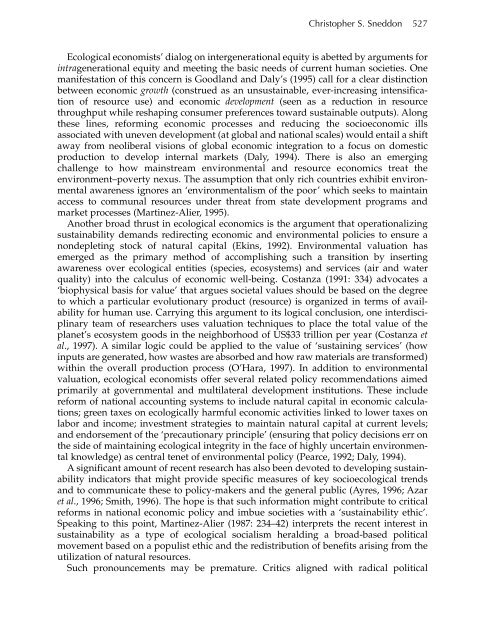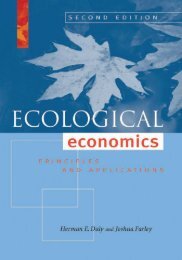2FGJN3
2FGJN3
2FGJN3
- No tags were found...
You also want an ePaper? Increase the reach of your titles
YUMPU automatically turns print PDFs into web optimized ePapers that Google loves.
Christopher S. Sneddon 527Ecological economists’ dialog on intergenerational equity is abetted by arguments forintragenerational equity and meeting the basic needs of current human societies. Onemanifestation of this concern is Goodland and Daly’s (1995) call for a clear distinctionbetween economic growth (construed as an unsustainable, ever-increasing intensificationof resource use) and economic development (seen as a reduction in resourcethroughput while reshaping consumer preferences toward sustainable outputs). Alongthese lines, reforming economic processes and reducing the socioeconomic illsassociated with uneven development (at global and national scales) would entail a shiftaway from neoliberal visions of global economic integration to a focus on domesticproduction to develop internal markets (Daly, 1994). There is also an emergingchallenge to how mainstream environmental and resource economics treat theenvironment–poverty nexus. The assumption that only rich countries exhibit environmentalawareness ignores an ‘environmentalism of the poor’ which seeks to maintainaccess to communal resources under threat from state development programs andmarket processes (Martinez-Alier, 1995).Another broad thrust in ecological economics is the argument that operationalizingsustainability demands redirecting economic and environmental policies to ensure anondepleting stock of natural capital (Ekins, 1992). Environmental valuation hasemerged as the primary method of accomplishing such a transition by insertingawareness over ecological entities (species, ecosystems) and services (air and waterquality) into the calculus of economic well-being. Costanza (1991: 334) advocates a‘biophysical basis for value’ that argues societal values should be based on the degreeto which a particular evolutionary product (resource) is organized in terms of availabilityfor human use. Carrying this argument to its logical conclusion, one interdisciplinaryteam of researchers uses valuation techniques to place the total value of theplanet’s ecosystem goods in the neighborhood of US$33 trillion per year (Costanza etal., 1997). A similar logic could be applied to the value of ‘sustaining services’ (howinputs are generated, how wastes are absorbed and how raw materials are transformed)within the overall production process (O’Hara, 1997). In addition to environmentalvaluation, ecological economists offer several related policy recommendations aimedprimarily at governmental and multilateral development institutions. These includereform of national accounting systems to include natural capital in economic calculations;green taxes on ecologically harmful economic activities linked to lower taxes onlabor and income; investment strategies to maintain natural capital at current levels;and endorsement of the ‘precautionary principle’ (ensuring that policy decisions err onthe side of maintaining ecological integrity in the face of highly uncertain environmentalknowledge) as central tenet of environmental policy (Pearce, 1992; Daly, 1994).A significant amount of recent research has also been devoted to developing sustainabilityindicators that might provide specific measures of key socioecological trendsand to communicate these to policy-makers and the general public (Ayres, 1996; Azaret al., 1996; Smith, 1996). The hope is that such information might contribute to criticalreforms in national economic policy and imbue societies with a ‘sustainability ethic’.Speaking to this point, Martinez-Alier (1987: 234–42) interprets the recent interest insustainability as a type of ecological socialism heralding a broad-based politicalmovement based on a populist ethic and the redistribution of benefits arising from theutilization of natural resources.Such pronouncements may be premature. Critics aligned with radical political



